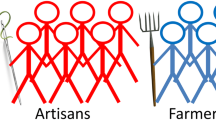Abstract
We consider the classic puzzle of why people turn out for elections in substantial numbers even though formal analysis strongly suggests that rational agents would not vote. If one assumes that voters do not make systematic mistakes, the most plausible explanation seems to be that agents receive a warm glow from the act of voting itself. However, this begs the question of why agents feel a warm glow from participating in the electoral process in the first place. We approach this question from a memetic standpoint. More specifically, we consider a model in which social norms, ideas, values, or more generally, “memes”, influence the behavior of groups of agents, and in turn, induce a kind of competition between value systems. We show, for a range of situations, that groups with a more public-spirited social norm have an advantage over groups that are not as public-spirited. We also explore conditions under which the altruistic behavior resulting from public-spiritedness is disadvantageous. The details depend on the costs of voting, the extent to which different types of citizens agree or disagree over the benefits of various public policies, and the relative proportions of various preference types in the population. We conclude that memetic evolution over social norms may be a force that causes individuals to internalize the benefits that their actions confer on others.
Similar content being viewed by others
References
Aldrich JH (1997) When is it rational to vote. In: Muller DC (eds) Perspectives on public choice, Chap 17. Cambridge University Press, Cambridge
Andreoni J (1990) Impure altruism and donations to public choice: a theory of warm-glow giving. Econ J 100:464–477
Andreoni J (1995) Warm-glow versus cold-prickle: the effects of positive and negative framing on cooperation in experiments. Q J Econ 1–21
Becker G (1976) Altruism, egoism, and genetic fitness: economics and sociobiology. J Econ Liter 14:817–826
Bergstrom TC, Stark O (1993) How can altruism prevail in an evolutionary environment. Am Econ Rev 83:149–155
Bester H, Guth W (1998) Is altruism evolutionarily stable? J Econ Behav Organization 34:193–209
Blackmore S (1999) The meme machine Oxford University Press
Bolle F (2000) Is altruism evolutionarily stable? And envy and malevolence? Remarks on Bester and Guth. J Econ Behav Organization 42:131–133
Conley J, Temimi A (2001) Endogenous enfranchisement when groups’ preferences conflict. J Polit Econ 109:79–102
Conley JP, Toossi A, Wooders M (2005) Memetics and voting: how nature may make us public spirited. Working paper 0514, Department of Economics, Vanderbilt University
Dawkins R (1976) The selfish gene Oxford University Press
DeMichelis S, Dhillon A (2001) Learning in elections and voter turnout equilibria. Manuscript
Downs A, (1957) An economic theory of democracy. Harper and Row, New York
Eshel I, Samuelson L, Shaked A (1998) Altruists, egoists, and hooligans in a local interaction model. Am Econ Rev 88:157–179
Ferejohn JA, Fiorina MP (1974) The paradox of not voting: a decision theoretic analysis. Am Polit Sci Rev 68:525–536
Friedman D (1991) Evolutionary games in economics. Econometrica 637–666
Fudenberg D, Levine DK (1998) The theory of learning in games. The MIT Press
Green DP, Shapiro I (1994) Pathologies of rational choice theory: a critique of applications in political science. Yale University Press
Harbaugh W (1996) If people vote because they like to, then why do so many of them lie? Public Choice 89:63–76
Hirshleifer J (1977) Economics from a biological viewpoint. J Law Econ 20:1–52
Hirshleifer J (1978) Natural economics versus political economy. J Soc Biolo Struct 20:1–52
Kan K, Yang CC (2001) On expressive voting: evidence from the 1988 US Presidential Election. Public Choice, 108:295–312
Kandori M, Mailath G, Rob R (1993) Learnings, mutation, and long run equilibria in games. Econometrica 61:29–56
Lagunoff R (2000) On the evolution of pareto optimal behavior in repeated coordination problems. Int Econ Rev 41:273–293
Ledyard JO (1981) The paradox of voting and candidate competition: a general equilibrium analysis. In: Horwich G, Quirk J (eds) Essays in contemporary fields of economics. Purdue University Press, West Lafayette
Ledyard JO (1984) The pure theory of large two-candidate elections. Public Choice 44:7–41
Muller DC (1989) Public choice II: a revised edition of public choice. Cambridge University Press
Palfrey TR, Rosenthal H (1983) A strategic calculus of voting. Public Choice 41:7–53
Palfrey TR, Rosenthal H (1985) Voter participation and voter uncertainty. Am Polit Sci Rev 79:62–78
Possajennikov A (2000) On the evolutionary stability of altruistic and spiteful preferences. J Econ Behav Organization 42:125–129
Reiter S (2001) Interdependent preferences and groups of agents. J Econo Theory 3:27–69
Riker WH, Ordeshook PC (1968) A theory of the calculus of voting. Am Polit Sci Rev 62:25–43
Robson A (1996) A biological basis for expected and non-expected utility theory. J Econ Theory 68:397–424
Robson A (2001) The biological basis for economic behavior. J Econ Literature 39:11–33
Smith JM Price GR (1973) The logic of animal conflict. Nature 246:15–18
Taylor PD, Jonker LB, (1978) Evolutionary stable strategies and game dynamics. Math Biosci 145–156
Tullock G (1967) Towards a mathematics of Politics. University of Michigan Press, Ann Arbor
Weibull JW (1997) Evolutionary game theory. The MIT Press
Author information
Authors and Affiliations
Corresponding author
Rights and permissions
About this article
Cite this article
Conley, J.P., Toossi, A. & Wooders, M. Memetics and voting: how nature may make us public spirited. Int J Game Theory 35, 71–90 (2006). https://doi.org/10.1007/s00182-006-0045-2
Revised:
Published:
Issue Date:
DOI: https://doi.org/10.1007/s00182-006-0045-2




